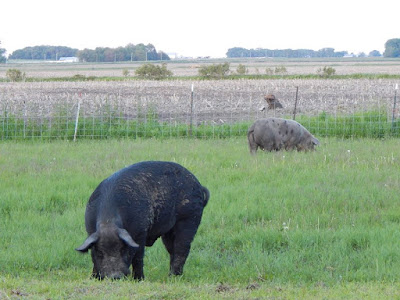Raising Pigs...Some Thoughts
I have some pretty strong feelings on raising pigs and earlier today I was in a group and answered a few questions about why pick one type of pig over another. In case someone else finds it of use, here we go:
If you don't plan to raise your pigs in a climate-controlled barn, with specialized high octane feed then try not to buy pigs from modern, confinement genetics. This has nothing to do with the great debate of confinement vs. pastured or industrial vs. organic, it's simple nature and nurture. We have had both types of pigs in multiple different scenarios on our farm and I cannot stress enough the HUGE differences between the 2 genotypes.
Modern confinement hogs have bred specifically bred for generations to grow quickly in a very tightly controlled environment with very specialized feed. They never deal with temperature variations, they live on a ration absolutely optimized for fast growth and they have temperaments defined by the world in which they live. If you cannot provide these things, which most of us wanting to raise a few feeder pigs cannot, then I strongly advise bypassing those types of pigs for pigs from lines that have been raised outdoors and even more preferable, those from heritage genetics. You will save yourself a lot of stress and money by not owning pigs that just won't thrive outdoors and get sick way easier that something that came from a background more genetically suited to the task.
Heritage-line pigs, which really just means the fatter, lard-style pigs that our great-great grandfathers raised versus the ultra-lean modern lines, are typically hardier in an outdoor environment (better in the cold and won't get sunburned in the summer), have better feed efficiency on less optimal feed and are calmer and easier to work with. Not to mention these fat breeds typically taste WAY better as pigs were never meant to be lean "the other white meat"...that was a by-product of a commercial hog industry breeding the most efficient hogs possible and ending up with loin eyes entirely devoid of fat. A good pork chop should have the same marbling as a prime ribeye from a beef.
And this absolutely doesn't mean you need to go get some fancy purebred "Save a Breed" expensive heritage hog (sorry breeders), but just seeking out a pig from the right background. Know the farmer you are getting your piglets from, understand how he/she raises them and what their aim and purpose is and look at the breeding stock to see if it fits the kind of environment you will provide. There are lots of folks out there breeding pigs that are reasonably priced and a good cross of old and new genetics--making them relatively efficient, easy to work with and able to handle the environment the average small farmer can provide. Seek them out, it will be worth every minute you use and penny you spend.
If you don't plan to raise your pigs in a climate-controlled barn, with specialized high octane feed then try not to buy pigs from modern, confinement genetics. This has nothing to do with the great debate of confinement vs. pastured or industrial vs. organic, it's simple nature and nurture. We have had both types of pigs in multiple different scenarios on our farm and I cannot stress enough the HUGE differences between the 2 genotypes.
Modern confinement hogs have bred specifically bred for generations to grow quickly in a very tightly controlled environment with very specialized feed. They never deal with temperature variations, they live on a ration absolutely optimized for fast growth and they have temperaments defined by the world in which they live. If you cannot provide these things, which most of us wanting to raise a few feeder pigs cannot, then I strongly advise bypassing those types of pigs for pigs from lines that have been raised outdoors and even more preferable, those from heritage genetics. You will save yourself a lot of stress and money by not owning pigs that just won't thrive outdoors and get sick way easier that something that came from a background more genetically suited to the task.
Heritage-line pigs, which really just means the fatter, lard-style pigs that our great-great grandfathers raised versus the ultra-lean modern lines, are typically hardier in an outdoor environment (better in the cold and won't get sunburned in the summer), have better feed efficiency on less optimal feed and are calmer and easier to work with. Not to mention these fat breeds typically taste WAY better as pigs were never meant to be lean "the other white meat"...that was a by-product of a commercial hog industry breeding the most efficient hogs possible and ending up with loin eyes entirely devoid of fat. A good pork chop should have the same marbling as a prime ribeye from a beef.
And this absolutely doesn't mean you need to go get some fancy purebred "Save a Breed" expensive heritage hog (sorry breeders), but just seeking out a pig from the right background. Know the farmer you are getting your piglets from, understand how he/she raises them and what their aim and purpose is and look at the breeding stock to see if it fits the kind of environment you will provide. There are lots of folks out there breeding pigs that are reasonably priced and a good cross of old and new genetics--making them relatively efficient, easy to work with and able to handle the environment the average small farmer can provide. Seek them out, it will be worth every minute you use and penny you spend.



Comments
Post a Comment